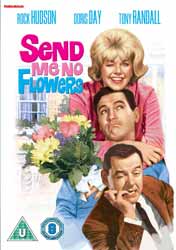|
Click here to return to the main site. DVD Review
George Kimbell spends the greater part of his life obsessing about his health. When he attends his doctor about a minor pain in his chest, he overhears his doctor discussing another patient who is terminal. George immediately thinks that he is the patient. Believing that his wife, Judy, would be unable to cope without him he sets about, with the help of his friend, Arnold Nash, in finding a replacement husband before he dies... Send Me No Flowers (1964) is a comedy directed by Norman Jewison and staring Rock Hudson (George), Doris Day (Judy) and Tony Randall (Arnold). The screenplay by Julius J. Epstein was based on an original Broadway play, written by Norman Barasch and Carroll Moore. The film won Day a Golden Laurel, in 1964 for her portrayal of Judy, Hudson came third. The film represents the third and last of a successful run of comedies which pared Hudson and Day, but it is evident that the steam was going out of the relationship. The film also suffered from changing social expectations and the role of Judy was presented as both too virginal, even for a married woman, and too helpless in the face of change. The early sixties was not a good time to make a film about a husband having to find a replacement wife as his wife was passive and potentially acopic in the face of losing her husband. That is not to say that the three main leads are not good. Day performs as ever, which in and of itself is fine, but more suited to the films of the fifties. Hudson was ever a versatile actor, in both drama and comedy and his scenes with Randall are the most effective of the film. The story is small and fails to really break out of its theatre beginnings, a comedy of errors where the humour comes from the interactions of the main players. The world is a pastel cavalcade portrayal of a middle class America which probably never existed, the reverse side of David Lynch’s Blue Velvet. Ultimately, the material is too flimsy to maintain the story with Judy suspecting that her husband is trying to palm her off to other men in order to have an affair. Even when he tries to explain that he believes that he is dying, her disbelief is at odds with everything we have witnessed and made little sense. Not a bad comedy, if a bit light, but not in the same league as Hudson and Day's best film, Pillow Talk (1959). The print is a little grainy, probably from the original film stock and a little soft. 6 Charles Packer Buy this item online
|
|---|

